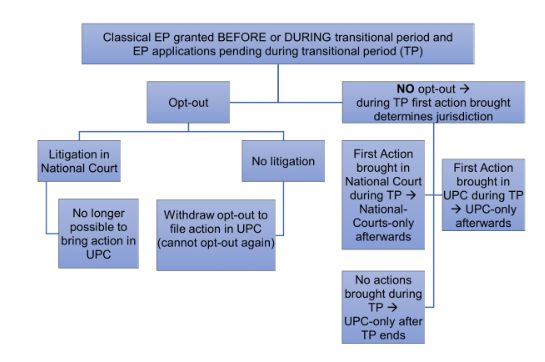With Germany expected to deposit its instrument of ratification of the Unified Patent Court Agreement (UPCA) in the coming months, it is predicted that the Unitary Patent Package (UPP) may enter into force in late 2022 or early 2023. Once the UPP enters into force, applicants will have the choice of continuing along the current "classical" system of validating a granted European patent in individual EPC member states or requesting unitary effect, which would lead to a single "unitary" patent covering all the UPCA participating states at the time of the request. For EPC member states that are not participating in the UPCA at the time of the request, only the existing "classical" validation system will be available.
It may however come as a surprise to some that for an initial seven-year period, pending applications and classical European patents granted before the end of this transitional period could be brought under the jurisdiction of the UPC. Specifically, during this transitional period, legal action in respect of a pending European application or a "classical" European patent validated in UPCA participating states may be brought either before the UPC or before national courts, unless the applicant or proprietor has opted out of the jurisdiction of the UPC, in which case legal action may only be brought before the national courts. Furthermore, once legal action in respect of an application or patent has commenced before the UPC, it cannot be brought back to the jurisdiction of the national courts, and vice versa. Given all the advantages, disadvantages, risks, and uncertainties of litigating before the UPC (see our article), and given how soon the UPP may enter into force, it is important for applicants and proprietors to start considering now whether to opt out.
The process of opting out is relatively simple, with no official fee, and an opt-out may be withdrawn at a later date. There are however some practical considerations to bear in mind.
An opt-out can be requested as soon as Germany deposits its ratification instrument. It can only be filed once and withdrawn once. Once an opt-out has been filed, it remains in effect unless it is withdrawn. If an opt-out is withdrawn during the seven-year transitional period, then for the remainder of the transitional period the patent or application would be under the dual jurisdictions of the national courts and the UPC, and under the exclusive jurisdiction of the UPC at the end of the transitional period. If the opt-out is withdrawn after the end of the transitional period, the patent or application would simply fall directly under the exclusive jurisdiction of the UPC.

It is also important to note that if the opt-out is filed in the three to four month "sunrise period", between Germany depositing its ratification instrument and the UPP actually entering into force, it would not be possible for the application or patent to be litigated before the UPC. This may be desirable to some applicants or proprietors by completely eliminating the risk of central revocation before the UPC. Whereas if the opt-out is filed after the UPP has entered into force, there would be a window in which legal action could be brought before the UPC, thereby putting the application or patent at risk of central revocation.
The person entitled to file an opt-out is the legal applicant of an application or the legal proprietor of a patent, or their representative. It is important to note here that the legal applicant or proprietor may not be the same as the applicant or proprietor on record on the official register(s). For example, where an assignment of a patent or application has taken place but not yet been recorded, the legal applicant or proprietor would not be the same as the applicant or proprietor on record. If the applicant or proprietor on record is not the same as the person making the opt-out request, and the opt-out request is not accompanied by a declaration of ownership, the opt-out request would be invalid and the application or patent would be vulnerable to the risk of central revocation before the UPC. It is therefore important to ensure any assignments are properly executed and recorded well in advance to avoid any complications when it comes to making the opt-out request.
The UPC computer systems are currently undergoing final stages of testing. We expect once up and running it will be possible to request opt-out for a single application or patent as well as multiple applications or patents, at which point we will seek your instructions on if and which of your patent(s) or application(s) you wish to opt out. If you have already made a decision in this regard, please let us know and we will begin to make the necessary preparations for when the system becomes fully operational.
The content of this article is intended to provide a general guide to the subject matter. Specialist advice should be sought about your specific circumstances.


